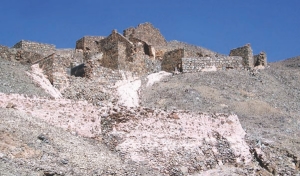While Centamin Egypt (CEE-T, CEY-L) has become synonymous with modern gold mining in Egypt, another, much smaller player, is looking to steal a bit of its thunder in the land of the pharaohs.
Alexander Nubia (AAN-V) is fresh off of an initial public offering on the TSX Venture Exchange that brought $3.3 million into its coffers. Now the company is looking to turn that money into good results on the ground with a 7,500-metre drill program at a project 400 km south of Cairo.
Alex Massoud, Alexander Nubia’s chief executive, says while the company has acquired claims on 3,200 sq. km of prospective land, it will focus the drills on the Abu Marawat project.
The reason for Abu Marawat’s privileged status, is the fact that it has had the most historic work done on it and because that work points to a potentially significant find.
But if investors are wondering how any prospective ground could have escaped the net of Centamin, the short answer is that Abu Marawat didn’t.
Centamin had the project in the earlier part of the decade, but with Egyptian laws forcing companies to work on a project or get off of it, Centamin let its claims lapse so that it could put all of its resources into developing the large-scale Sukari gold mine, which sits 200 km south of Abu Marawat.
What Centamin left behind was a project that had been drill-tested down to the 70-metre level — enough to get a feel for the oxide zone, but not enough to test if the gold-bearing veins continued into a sulphide zone.
The owner previous to Centamin, Minex, managed to come up with a non-compliant resource on that oxide zone of 410,000 tonnes grading between 4 grams and 8 grams gold for an estimated 130,000 oz. gold. And while the assays returned decent grades of copper, zinc and silver, that estimate is not in gold-equivalent ounces.
Some highlight holes drilled by Minex in 1989 included 13.1 metres grading 5.57 grams gold, 59.4 grams silver, 0.48% zinc and 0.54% copper and an other hole that returned 4 metres of 15.8 grams gold, 217.7 metres silver, 6.9% zinc and 1.09% copper. The intercepts represent true widths.
While the financial collapse of 2008 slowed progress at the project, in the three years that Alexander Nubia has had the project it has done geological, geophysical and geochemical work in an effort to delineate the best targets for its upcoming drill program.
Massoud says drills should be turning within 10 weeks and that holes will be going to the 100-, 200- and 500-metre levels.
Heading the exploration is John Payne, a geologist who previously worked on exploration efforts at the Pebble gold mine in Alaska and Campo Morado in Mexico.
The exploration team seems to have their hands on some mesothermal mineralization with two parallel veins, named CVZ and Fin.
While at surface, Massoud says the mineralized zones are only about 2 metres wide, historic drill core demonstrates that they widen at depth to upwards of 8 metres.
As for doing business in Egypt, Massoud, who is Egyptian born and Western educated, says the environment for miners and explorers improved greatly when the state mining entity moved out from under the ministry of industry and into the ministry of petroleum’s portfolio in 2005.
The switch, Massoud says, brought a more progressive attitude towards the mining industry.
One stumbling block that remains for some investors, however, is the fact that Egyptian legislation calls for half of a mine’s profits to flow into state coffers once all of the development costs associated with construction are paid.
While this may sound onerous, Massoud explains that when it is considered that the 50% that the company keeps is tax-free, the economics for a future mine end up being similar to other jurisdictions.
“To some extent the legislation in the country has been misunder- stood,” Massoud says. “Centamin’s situation is similar to ours and every oil and gas concession, which is that each concession is its own decreed law.”
He says by having a decreed law for each project, investors can feel confident that parliamentary changes wouldn’t affect the terms agreed upon at a specific project.
As for the long dormancy of the mining industry in the country, Massoud says two key factors were at play. One was the government’s focus on developing oil and gas plays and the other was that just two companies, Centamin and Hamash, had locked up the vast majority of the prospective ground.
Alexander Nubia is living proof that isn’t the case anymore.


Be the first to comment on "The newest play on the Egyptian gold scene"